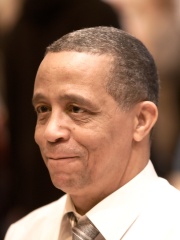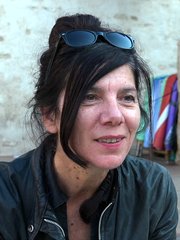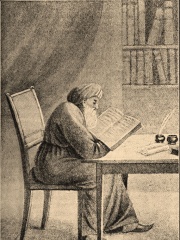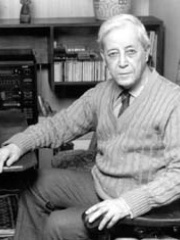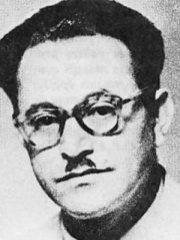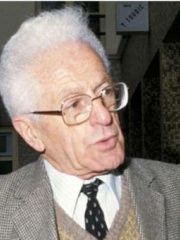

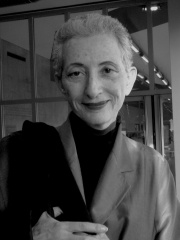
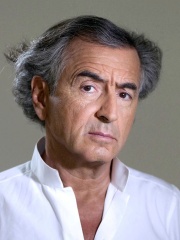

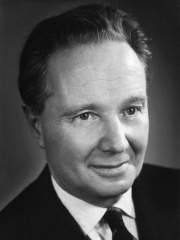
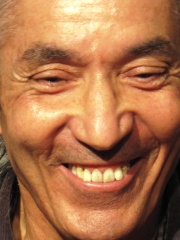
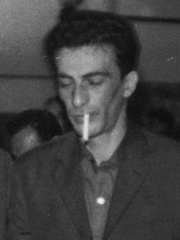
The Most Famous
WRITERS from Algeria
Top 10
The following people are considered by Pantheon to be the top 10 most legendary Algerian Writers of all time. This list of famous Algerian Writers is sorted by HPI (Historical Popularity Index), a metric that aggregates information on a biography's online popularity. Visit the rankings page to view the entire list of Algerian Writers.

1. Albert Camus (1913 - 1960)
With an HPI of 86.77, Albert Camus is the most famous Algerian Writer. His biography has been translated into 139 different languages on wikipedia.
Albert Camus ( kam-OO, French: [albɛʁ kamy] ; 7 November 1913 – 4 January 1960) was a French philosopher, novelist, author, dramatist, journalist, world federalist, and political activist. He was the recipient of the 1957 Nobel Prize in Literature at the age of 44, the second-youngest recipient in history. His works include The Stranger, The Plague, The Myth of Sisyphus, The Fall and The Rebel. Camus was born in French Algeria to pied-noir parents. He spent his childhood in a poor neighbourhood and later studied philosophy at the University of Algiers. He was in Paris when the Germans invaded France during World War II in 1940. Camus tried to flee but finally joined the French Resistance where he served as editor-in-chief at Combat, an outlawed newspaper. After the war, he was a celebrity figure and gave many lectures around the world. He married twice but had many extramarital affairs. Camus was politically active; he was part of the left that opposed Joseph Stalin and the Soviet Union because of their totalitarianism. Camus was a moralist and leaned towards anarcho-syndicalism. He was part of many organisations seeking European integration. During the Algerian War (1954–1962), he kept a neutral stance, advocating a multicultural and pluralistic Algeria, a position that was rejected by most parties. Philosophically, Camus's views contributed to the rise of the philosophy known as absurdism. Some consider Camus's work to show him to be an existentialist, even though he himself firmly rejected the term throughout his lifetime.

2. Apuleius (125 - 170)
With an HPI of 80.60, Apuleius is the 2nd most famous Algerian Writer. His biography has been translated into 72 different languages.
Apuleius ( APP-yuu-LEE-əs), also called Lucius Apuleius Madaurensis (c. 124 – after 170), was a Numidian Latin-language prose writer, Platonist philosopher and rhetorician. He was born in the Roman province of Numidia, in the Berber city of Madauros, modern-day M'Daourouch, Algeria. He studied Platonism in Athens, travelled to Italy, Asia Minor, and Egypt, and was an initiate in several cults or mysteries. The most famous incident in his life was when he was accused of using magic to gain the attentions (and fortune) of a wealthy widow. He declaimed and then distributed his own defense before the proconsul and a court of magistrates convened in Sabratha, near Oea (modern Tripoli, Libya). This is known as the Apologia. His most famous work is his bawdy picaresque novel the Metamorphoses, otherwise known as The Golden Ass. It is the only ancient Latin novel that has survived in its entirety. It relates the adventures of its protagonist, Lucius, who experiments with magic and is accidentally turned into a donkey. Lucius goes through various adventures before he is turned back into a human being by the goddess Isis.

3. Hélène Cixous (b. 1937)
With an HPI of 68.36, Hélène Cixous is the 3rd most famous Algerian Writer. Her biography has been translated into 45 different languages.
Hélène Cixous ( sihk-SOO; French: [siksu]; born 5 June 1937) is a French writer, playwright and literary critic. During her academic career, she was primarily associated with the Centre universitaire de Vincennes (today's University of Paris VIII), which she co-founded in 1969 and where she created the first centre of women's studies at a European university. Known for her experimental writing style and great versatility as a writer and thinker, she has written more than seventy books dealing with multiple genres: theatre, literary and feminist theory, art criticism, autobiography and poetic fiction. She first gained attention in 1969 with her first work of fiction, Dedans (Inside), a semi-autobiographical novel which won the Prix Médicis and explored the themes of identity, memory, death and writing. She is perhaps best known for her 1976 article "The Laugh of the Medusa", which established her as one of the early thinkers in post-structural feminism. She has collaborated with several artists and directors, such as Adel Abdessemed, Pierre Alechinsky, Simone Benmussa, Jacques Derrida, Simon Hantaï, Daniel Mesguich and Ariane Mnouchkine. She is considered a strong contender for the Nobel Prize in Literature.

4. Bernard-Henri Lévy (b. 1948)
With an HPI of 67.63, Bernard-Henri Lévy is the 4th most famous Algerian Writer. His biography has been translated into 42 different languages.
Bernard-Henri Georges Lévy (; French: [bɛʁnaʁ ɑ̃ʁi ʒɔʁʒ levi]; born 5 November 1948) is a French public intellectual. Often referred to in France simply as BHL, he was one of the leaders of the "Nouveaux Philosophes" (New Philosophers) movement in 1976. His opinions, political activism, and publications have also been the subject of several controversies over the years.
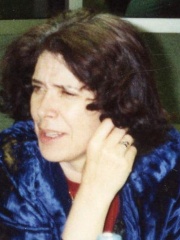
5. Assia Djebar (1936 - 2015)
With an HPI of 67.24, Assia Djebar is the 5th most famous Algerian Writer. Her biography has been translated into 48 different languages.
Fatima-Zohra Imalayen (Arabic: فاطمة الزهراء إيمالاين; 30 June 1936 – 6 February 2015), known by her pen name Assia Djebar (Arabic: آسيا جبار), was an Algerian novelist, translator and filmmaker. Most of her works deal with obstacles faced by women, and she is noted for her feminist stance. She is "frequently associated with women's writing movements, her novels are clearly focused on the creation of a genealogy of Algerian women, and her political stance is virulently anti-patriarchal as much as it is anti-colonial." Djebar is considered to be one of North Africa's pre-eminent and most influential writers. She was elected to the Académie française on 16 June 2005, the first writer from the Maghreb to achieve such recognition. For the entire body of her work she was awarded the 1996 Neustadt International Prize for Literature. She was often named as a contender for the Nobel Prize for Literature.

6. Marcus Minucius Felix (110 - 260)
With an HPI of 67.16, Marcus Minucius Felix is the 6th most famous Algerian Writer. His biography has been translated into 29 different languages.
Marcus Minucius Felix (died c. 250 AD in Rome) was one of the earliest of the Latin apologists for Christianity. Nothing is known of his personal history, and even the date at which he wrote can be only approximately ascertained as between AD 150 and 270. Jerome's De Viris Illustribus No. 58 speaks of him as "Romae insignis causidicus" [one of Rome's notable solicitors], but in that he is probably only improving on the expression of Lactantius who speaks of him as "non ignobilis inter causidicos loci" [not unknown among solicitors of the place].

7. Robert Merle (1908 - 2004)
With an HPI of 66.26, Robert Merle is the 7th most famous Algerian Writer. His biography has been translated into 33 different languages.
Robert Merle (French: [ʁɔbɛʁ mɛʁl]; 28 August 1908 – 27 March 2004) was a French novelist.

8. Boualem Sansal (b. 1949)
With an HPI of 64.62, Boualem Sansal is the 8th most famous Algerian Writer. His biography has been translated into 29 different languages.
Boualem Sansal (Arabic: بوعلام صنصال, born 15 October 1949 in Theniet El Had) is an Algerian author who writes in French. He holds an engineering degree from the National Polytechnic School and a PhD in economics. Sansal has worked as a teacher, consultant, business leader, and senior official in Algeria’s Ministry of Industry. After retiring from his high-ranking government position, he began writing novels at the age of 50. He is known for his outspoken criticism of Islamism. Sansal has authored several novels that have earned him literary awards mainly French, including the Prix du Premier Roman (1999), the Prix Nessim-Habif (2008), the Peace Prize of the German Book Trade (2011), the Grand Prix du roman de l'Académie française (2015), and the Prix mondial Cino Del Duca (2025). He was imprisoned in Algeria on 16 November 2024, shortly after publicly challenging the country’s borders in Frontières, a far-right French media outlet. His arrest has escalated the diplomatic tensions between Algeria and France. On March 27, 2025, he was sentenced to five years in prison. He was pardoned on November 12, 2025 and was transferred to Germany for medical treatment.

9. Kateb Yacine (1929 - 1989)
With an HPI of 63.11, Kateb Yacine is the 9th most famous Algerian Writer. His biography has been translated into 29 different languages.
Kateb Yacine (Arabic pronunciation: [kæːtb jæːsiːn]; 2 August 1929 or 6 August 1929 – 28 October 1989) was an Algerian writer notable for his novels and plays, both in French and Algerian Arabic, and his advocacy of the Berber cause.

10. Al-Busiri (1213 - 1294)
With an HPI of 62.37, Al-Busiri is the 10th most famous Algerian Writer. His biography has been translated into 18 different languages.
Al-Būṣīrī (Arabic: أبو عبد الله محمد بن سعيد بن حماد الصنهاجي البوصيري, romanized: Abū ʿAbdallāh Muhammad ibn Saʿīd al-Ṣanhājī al-Būṣīrī; 1212–1294) was a Sanhaji Sufi Sunni Muslim poet belonging to the Shadhili, and a direct disciple of the Sufi saint Abu al-Abbas al-Mursi. His magnum opus, the Qaṣīda al-Burda "Poem of the Mantle" in praise of Prophet Muhammad is one of the most popular Islamic poems of the genre. It is in Arabic, as is his other ode named "Al-Hamziyya".
People
Pantheon has 22 people classified as Algerian writers born between 110 and 1965. Of these 22, 6 (27.27%) of them are still alive today. The most famous living Algerian writers include Hélène Cixous, Bernard-Henri Lévy, and Boualem Sansal. The most famous deceased Algerian writers include Albert Camus, Apuleius, and Assia Djebar. As of April 2024, 2 new Algerian writers have been added to Pantheon including Brigitte Giraud, and Mimi Hafida.
Living Algerian Writers
Go to all RankingsHélène Cixous
1937 - Present
HPI: 68.36
Bernard-Henri Lévy
1948 - Present
HPI: 67.63
Boualem Sansal
1949 - Present
HPI: 64.62
Yasmina Khadra
1955 - Present
HPI: 60.36
Brigitte Giraud
HPI: 51.60
Mimi Hafida
1965 - Present
HPI: 45.91
Deceased Algerian Writers
Go to all RankingsAlbert Camus
1913 - 1960
HPI: 86.77
Apuleius
125 - 170
HPI: 80.60
Assia Djebar
1936 - 2015
HPI: 67.24
Marcus Minucius Felix
110 - 260
HPI: 67.16
Robert Merle
1908 - 2004
HPI: 66.26
Kateb Yacine
1929 - 1989
HPI: 63.11
Al-Busiri
1213 - 1294
HPI: 62.37
Isaac Alfasi
1013 - 1103
HPI: 61.99
Mohammed Dib
1920 - 2003
HPI: 61.69
Mouloud Feraoun
1913 - 1962
HPI: 60.53
Ahmed Mohammed al-Maqqari
1578 - 1632
HPI: 59.72
Mouloud Mammeri
1917 - 1989
HPI: 59.28
Newly Added Algerian Writers (2025)
Go to all RankingsOverlapping Lives
Which Writers were alive at the same time? This visualization shows the lifespans of the 11 most globally memorable Writers since 1700.

